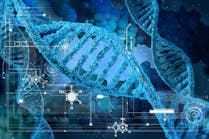One of the greatest mysteries of the COVID-19 pandemic is why some people fall severely ill while others suffer nary a sniffle. Now, after compiling data from around the world, researchers have determined that the answer seems to lie, in part, in genetics, as reported in a news release from Stanford Medicine.
Through an international meta-analysis of studies from more than 20 countries, hundreds of researchers, including dozens from Stanford Medicine, have uncovered 13 genetic signatures that are closely linked to an increased risk for developing severe COVID-19.
"Teams of scientists from around the world shared data as quickly as it was generated, and this data was analyzed almost as quickly as it was shared," said Manuel Rivas, DPhil, Assistant Professor of Biomedical Data Science. "That's transformative for our understanding of the genetics behind COVID-19 infection. This type of rapid data sharing and analysis hasn't been the model for studying other viruses, but it really should be."
The analysis, which was published online in Nature, was led by researchers at the Broad Institute and the University of Helsinki, with data and analysis contributions from Stanford Medicine researchers.
The international researchers collected genome sequencing data from nearly 50,000 patients, 1,000 of whom came from Stanford, and conducted a massive comparison of their genomes. All the patients had been hospitalized with COVID-19 and were therefore classified as having had severe illness.
Researchers were looking for a pattern: any overlap in genetic variants, or mutations in DNA, that patients harbored. The thinking was, if certain mutations were shared among only those who were hospitalized, those changes were likely involved in exacerbating infection and symptoms. After distilling the trove of information, 13 mutations stood out.
"We were surprised to see that many of these mutations seemed to be involved in autoimmunity," said Rivas.
Other genetic variants were found in genes known to play a role in lung disease susceptibility or immunity. One was found in a gene related to the protein ACE2, the main protein that SARS-CoV-2 targets to enter and infect a cell.
Although each of the 13 variants increased risk for severe COVID-19, some of them put individuals at a greater risk than did others. For instance, one variant increased an individual's risk for severe COVID-19 by about 50%, while the rest hovered around 10%, said Rivas. Not all patients had all mutations, and the analysis revealed that the more variants a person had, the greater their risk for severe disease. These results stayed consistent regardless of age and sex.
The international group plans to continue studying the genetics behind SARS-CoV-2 infection in larger populations in the hopes of identifying additional genetic signatures of increased risk for severe COVID-19, said Rivas. What's more, the paper will be one of the first examples of a "living" paper in Nature, meaning that it will be updated periodically to include new data and findings.





